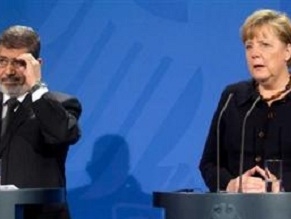|
World Jewish News

Egyptian President Mohamed Morsi and German Chancellor Angela Merkel speak at a press conference in Berlin.
|
On Morsi’s first state visit to Germany, Merkel insists ‘Egypt is an important voice and can make an important contribution’ to
01.02.2013, Israel and the World Egyptian President Mohammed Morsi made his first official visit to Berlin Wednesday since his election last year following 2011’s popular uprisings which ousted longtime secular leader Hosni Mubarak, as German Chancellor Angela Merkel insisted “work that needs to be done to move forward” in Egypt’s ongoing democratic transition.
In a joint press conference with the Islamist leader following discussions between the two, Merkel committed Germany’s help to the transition process, as she hailed Morsi’s contribution to negotiating November’s ceasefire in Gaza on behalf of the international community, concluding that “Egypt is an important voice and can make an important contribution”, as both recommitted their efforts towards securing a two state solution.
Responding to Merkel’s call to action on the Middle East, Morsi stressed there was a significant role for the US and international community to pay in brokering a peace deal, adding that, in light of his hosting of a meeting between estranged Gaza rulers Hamas and the internationally-recognised Palestinian Authority (PA) in Cairo earlier this month, “inter-Palestinian reconciliation is the main pillar of the peace process”.
The Eu has continually called for itnra-Palestinian reconciliation under the leadership of PA President Mahmoud Abbas, with Cypriot Foreign Minister Erato Kozakou-Markoulis, on behalf of the then Presidency of the EU, telling a sitting of the European Parliament plenary session in Strasbourg last month that such a reconciliation was “an important element of the unity of a future Palestinian state and for reaching a two state solution. Such reconciliation would also have a direct impact on the situation in Gaza, which is unsustainable as long as it remains politically and economically separated from the West Bank”.
Responding to questioning regarding a recently surfaced 2010 video of Morsi describing the Jewish States as “bloodsuckers”, “warmongers” and the “descendents of pigs and monkeys”, meanwhile, Morsi once again reiterated that his comments had been “taken out of context”.
“I am not against Judaism as a religion. I’m not against the right of Jews to practice their religion,” he stressed. “The behaviour which I condemn and refuse to accept is the law (of Israel) and the international institutions,” he added.
Germany continues to regard Egypt as a key ally in the Arab world and contributes a quarter of the pledged €5 billion donation committed by the EU last year to aid Egypt’s ailing economy and democratic transition. Morsi in turn expressed his gratitude for Germany having become one of the first countries to establish contact following the revolution, calling for that friendship to be further boosted.
Ahead of Morsi’s arrival in Berlin, German Foreign Minister Guido Westerwelle invoked recent violence in Egypt over its contested draft constitution, as he called got “strategic patience” in dealing with Egypt. “That means voicing criticism as well as ensuring that we do not scale down the dialogue but, rather, consolidate it. For dialogue is the best way to exert influence,” he added.
Westerwelle called on the two sides to the conflict to “seek an internal modus vivendi”, appealing to the Egyptian leadership to “respect democratic principles such as the separation of powers”. Furthermore, he said that he expected Egypt to continuing meeting its international obligations. In this respect, he commended Egypt’s role as mediator in the recent Gaza conflict.
The Minister went on to say that despite all the doubts and criticism democracy had to be given a real chance in Egypt. He added that revolutions rarely ran a straight course but often came up against setbacks. “Nevertheless, we must not give up on Egypt,” urged the German Foreign Minister, “Egypt is much too important for that.”
Ahead of the unveiling and first meeting of the German-Egyptian Joint Economic Commission (BGC) Westerwelle added that “the transformation partnership we’ve offered largely depends on advances being made in Egypt’s democratic development”.
by: Shari Ryness
EJP
|
|
